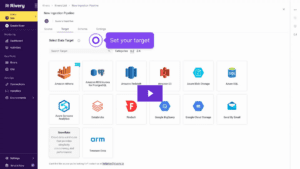Data rules the world in 2020.
In The Year of the Plague, just about everything is intertwined with digital data, from COVID research, to the stock market, to the healthcare system, to competitive yoyoing, to romantic relationships, to Bigfoot exploration. So it’s not a surprise that some of the top stories in 2020 revolved around data.
This year, we saw stories that illuminated fascinating data, how data impacts our lives, what the future of data will look like, how data has solved or created problems.
These stories captured not just the dumpster fire known as 2020, but also the fast-approaching future of our post-pandemic lives.
Here are the top 10 data stories in 2020 – the good, the bad, and the ugly – from big-picture news events, to random factoids.
1. Worldwide Internet Usage Reached 4.66 Billion in 2020

In 2020, more people than ever before gained access to the core data sharing infrastructure on the planet: the internet. Worldwide internet users reached 4.66 billion in 2020, or 59% of the global population.
This is roughly 1.5 billion more worldwide users than five years ago in 2015. Now more disadvantaged groups can access the information economy. And with the rise in remote working, anyone with internet access can work from anywhere on the planet.
2. The Plague of False Data: Coronavirus Misinformation

As the coronavirus ravaged the world, the virus also brought another plague: misinformation. While millions were quarantined in their houses, false data spread across the globe at a rapid rate.
Untrue data about the origin of the virus, methods for treating it, government lockdowns, and much more, hampered worldwide efforts to contain the pandemic.
Overall, online fake news cost the global economy $78 billion in 2020. Even after the pandemic is over, misinformation will still remain a key challenge for societies in the 21st century.
3. Big Tech in Big Trouble

This year, big tech was in the headlines for all the wrong reasons. Between misinformation, hurting news outlets, monopolism, and many other issues, big tech finally attracted the wrath of US lawmakers, regulators, and law enforcement.
This culminated in antitrust lawsuits filed by 46 states and the FTC against Facebook, along with the Department of Justice’s lawsuit against Google.
In Europe, regulators also proposed tougher oversight of the major tech companies, including record-setting fines.
The outcome of these regulatory efforts will shape the way billions of people around the world send, receive, and access data, from instant messages, to photos, to webpages, to information itself.
4. Netflix Data Reveals that Joe Exotic is the Most Popular Guy in South Africa

According to Netflix data, the most popular show in South Africa in 2020 was Tiger King: Murder, Mayhem, and Madness. This surprised many people, because Joe Exotic doesn’t seem to share cultural affinities with the people of South Africa.
But, on closer inspection, they do: both have noticeable accents, both harbor big cats (tigers vs. lions), and both are capable of producing awful noises (Joe Exotic: music videos; South Africans: vuvuzelas).
5. Zoom Takes Over: Platform Hits 300 Million Daily Meeting Participants

Half a decade ago, many different video chat/call services were vying to become the business standard. Skype, GoToMeeting, Google Hangouts, join.me, and many other services all tried to lay claim to the space.
However, once coronavirus foisted remote work upon the world, a clear champion emerged. Zoom, a leader in enterprise video communications, became the de facto platform for businesses, schools, Congress (against the wishes of some members), and many more entities.
This was not so much because of Zoom’s technical superiority, but rather product positioning. After nine years of consumer-friendly groundwork, with free accounts and free video calls for up to 100 attendees, Zoom was the fastest, simplest, and most user-friendly option for millions of at-home workers.
Today, Zooms records about 300 million daily meeting participants, acting as the primary video call platform for workers and organizations around the world.
6. Scientists Revolutionize Data Sharing to Fight Coronavirus

The coronavirus necessitated many unprecedented undertakings, including a revolution in the way scientists share data. With each passing day leading to more misery, scientists needed to break down the barriers that normally silo crucial scientific data.
Forgoing the lengthy peer review process, medical scientists shared raw results, experiments, and papers directly with other “rival” researchers around the globe in centralized online repositories.
As soon as raw COVID research was finished, it was available to medical experts around the world, all working on the same common epidemiological problem.
This cooperative “wartime” effort to share scientific data, instantly and universally, led to a vaccine in record time.
7. At the End of 2020, 99.98% of All Blockbuster Video Stores Didn’t Exist Any More

2020 has been something else. So it’s good to know that people are tackling the real problems, like tracking the number of Blockbuster Video stores still left in the world. This was the subject of a data project on Reddit’s r/dataisbeautiful subreddit.
According to the data, there were 4,755 Blockbuster stores in 2000. Since the closure of the Blockbuster in Morley, Australia in 2019, only one Blockbuster remains left on the entire planet: the location in Bend, Oregon.
Based on that data, 99.98% of all Blockbusters had closed by the end of 2020. The Bend, Oregon Blockbuster is like a zombie or something: not even a pandemic could bring it down.
8. Largest Hack of US Government Data in History

Toward the end of the year, reports emerged that a foreign actor had executed perhaps the single biggest hack of US government data in history.
The hackers did not directly attack US governmental agencies. Rather, the hackers placed trojan malware into commercial software produced by SolarWinds that many US government computers use.
The attack was broad and is believed to span several agencies, from the Pentagon, to the State Department, to the Department of Homeland Security, and many others.
This attack continues a key geopolitical trend: today’s battlefield is in cyberspace, and the spoils of victory are data rather than land.
9. Google Makes 25 Million Public Data Sets Searchable

In January 2020, Google released Dataset Search, a tool that enables users to search for 25 million publicly available datasets.
With the power of Google’s search functionality, users can easily locate widely diverse datasets, from the cat population in the Netherlands in 1997, to massive annotated image sets of historical events. The tool retains an indexation of over 6 million tables.
Dataset Search is a boost for data scientists and anyone else interested in testing hypotheses or training machine learning models. The tool is just one contribution to searchable datasets, but it highlights how these kinds of platforms will revolutionize machine learning throughout the 2020s.
Classification and searchability of data continue to be a key challenge for machine learning, and these types of platforms will help close the gap.
10. Tom Hanks Somehow Remains the Most Googled Actor in 2020

Tom Hanks starred in his first movie in 1980, a slasher flick called He Knows You’re Alone. The title basically sums up how I feel about Tom Hanks.
Every time I get a minute to myself, it seems Tom Hanks appears out of nowhere, jumping from behind a piece of furniture with a horrible new film that I don’t want to see.
And yet according to Google search data, he was still somehow the most Googled actor in 2020, 40 years after he inflicted his first movie on us.
I suppose that’s because he was one of the first major celebrities to contract coronavirus. I’m glad he’s OK, but Tom, can you please stop making movies? If you film Castaway 2, stay on the island.
Data Is the Story of Our Time
More and more often, data is not simply a part of the story. Data is the story.
These top data stories from 2020 demonstrate how data is shaping our world, from the most consequential governmental actions, to the TV ratings of a convicted felon and ex-exotic pet dealer who is currently banned from his own zoo.
But no matter the story, data always tells us more about the world, and helps us make sense of it. As we move into 2021, data will continue to drive intriguing and important stories.
Minimize the firefighting. Maximize ROI on pipelines.





